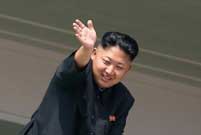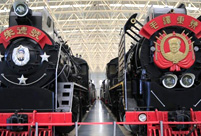Terrorists have been increasingly active recently and have joined "East Turkistan" forces in causing a series of incidents in Central Asia and China's Xinjiang Uygur autonomous region.
Chen said there is a risk of further political turmoil in Afghanistan after 2014, which may have a direct impact on Central Asian countries.
Afghanistan-based terrorist groups might also penetrate Central Asia, while the drug problem in Afghanistan is also likely to get out of control and affect other nations in the region.
Chen said the SCO will promote reconciliation among various political powers in Afghanistan and introduce the country to multilateral programs under the SCO framework to help with its economic development.
Sun Zhuangzhi, an expert in Central Asian studies with the Chinese Academy of Social Sciences, said that of the six countries bordering Afghanistan, three are SCO members, while two are SCO observers.
"Even Afghanistan itself is an SCO observer."
The SCO was founded in 2001 in Shanghai by China, Russia, Kazakhstan, Kyrgyzstan, Tajikistan and Uzbekistan. Iran, Afghanistan, India, Mongolia and Pakistan have the status of SCO observers.
On Friday, Xi also suggested carrying forward the spirit of the Silk Road.
In a speech in Kazakhstan on Sunday, he proposed establishing a Silk Road Economic Belt, similar to the original, ancient Silk Road, to improve cooperation between China and countries in Europe and Asia.
Xinhua contributed to this story.

 DPRK holds military parade to mark 65th founding anniv.
DPRK holds military parade to mark 65th founding anniv. Highlights of MAKS 2013 Int'l Aviation and Space Show
Highlights of MAKS 2013 Int'l Aviation and Space Show  10th China-ASEAN Expo opens in Nanning
10th China-ASEAN Expo opens in Nanning Photo story: A primary school of only two people
Photo story: A primary school of only two people An elderly Chinese street cleaner's love story
An elderly Chinese street cleaner's love story 'College campus queens' welcome the new students
'College campus queens' welcome the new students  'Travel everywhere in Beijing': China Railway Museum
'Travel everywhere in Beijing': China Railway Museum Chinese sports stars' school photos
Chinese sports stars' school photos  Players shining at the 12th National Games of China
Players shining at the 12th National Games of China Residences of the royal house of Savoy
Residences of the royal house of Savoy China's frigate 'Bengbu'in fire training
China's frigate 'Bengbu'in fire training The last days of Wan Aihua
The last days of Wan Aihua Highlights at 12th National Games of China
Highlights at 12th National Games of China Beijing Film Academy welcomes freshmen
Beijing Film Academy welcomes freshmen 2013 Taiwan Int'l Tourism Expo kicks off in Taipei
2013 Taiwan Int'l Tourism Expo kicks off in TaipeiDay|Week|Month